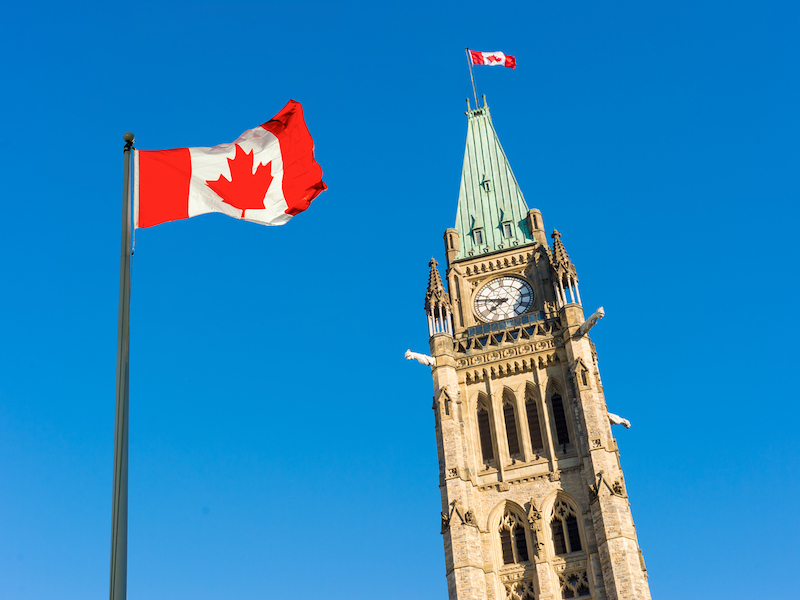
Raising taxes on corporations that thrived during the pandemic, ensuring Canadians have access to affordable housing, and bolstering regulations governing financial institutions were among the priorities outlined today for Chrystia Freeland, Deputy Prime Minister and Minister of Finance.
Prime Minister Justin Trudeau’s mandate letter to Freeland charges her with moving forward on a host of proposals, many of which were first introduced in the 2021 budget and Liberals’ 2021 election campaign platform, but which weren’t addressed in the fiscal update tabled in the House of Commons on Tuesday.
The letter directed Freeland to introduce legislation to raise the corporate income tax payable by banks and insurance companies that earn more than $1 billion and to require them to pay a temporary Canada Recovery Dividend. She was also asked to establish a minimum 15% tax rule for top-bracket earners.
Trudeau also asked Freeland to invest in the Canada Revenue Agency to close the tax gap and combat aggressive tax planning and avoidance, and to modernize the general anti-avoidance rule regime. (Similar directives were given to the Minister of National Revenue.)
Freeland was also charged with working with global partners to bring the OECD/G20 agreement on tax reform related to the world’s largest corporations into effect, while also moving ahead with legislation to implement a Digital Services Tax for 2024 in case the treaty is not in force by then.
On housing affordability, Trudeau told Freeland to introduce legislation to double the First-Time Home Buyers’ Tax Credit and to work with financial institutions to create a tax-free First Home Savings Account. Both changes were promised in the 2021 election.
Other directives on housing included:
- Introduce legislation to double the Home Accessibility Tax Credit and to establish a new Multigenerational Home Renovation tax credit.
- Introduce an anti-flipping tax on residential properties, requiring properties to be held for at least 12 months, and implement the tax on non-resident, non-Canadian owners of vacant, underused housing, an issue Freeland addressed in the fiscal update.
- Consider measures to increase consumer protection and transparency in real estate transactions, including a ban on blind bidding.
- Identify how federal regulators can be better respond to housing price fluctuations and to foster a more stable Canadian housing market.
- Establish a ban on foreign investment capital in non-recreational residential property for the next two years.
Other key directives in the mandate letter, by category, were:
Regulatory changes
- Establish a single, independent ombudsperson, with the power to impose binding arbitration, to address consumer complaints involving banks.
- Crack down on “predatory” lenders charging excessive interest rates.
- Adapt and apply the Canada Business Corporations Act diversity requirements to federally regulated financial institutions to ensure diversity in senior ranks.
- Require federally regulated financial institutions to offer flexible repayment options to individuals who face a life event causing financial stress, including a six-month deferral of mortgage payments in qualifying circumstances.
- Advance legislation to enhance the powers of the Financial Consumer Agency of Canada to review bank fees and charges and to require adjustments if they are excessive.
- Support the Minister of Public Safety in their work to consider options to strengthen laws and investigative powers related to major financial crimes and to bring forward a proposal to establish a Canada Financial Crimes Agency.
- Implement a beneficial ownership registry.
Pensions
Work with provinces and territories over the next review cycle to increase the Canada Pension Plan and Quebec Pension Plan survivor’s benefit by 25%, a promise made during the 2019 election campaign.
Tax credits
- Introduce a Labour Mobility Tax Credit of up to $600 a year for workers in the building and construction trades in eligible travel and temporary relocation expenses, and a Career Extension Tax Credit of up to $1,650 a year for seniors who want to stay in the workforce.
- Introduce a 15% tax credit of up to $500 to cover the cost of appliance repairs performed by technicians.
- Introduce a one-time income tax deduction for health care professionals new in their careers to help with the costs of setting up their practice in a rural community.
- Convert the Canada Caregiver Credit into a refundable tax-free benefit, allowing caregivers to receive up to $1,250 a year, as promised during the 2021 election.
In his mandate letter to the Minister of Seniors, Trudeau directed Kamal Khera to increase the guaranteed income supplement by $500 for single seniors and $750 for couples starting at age 65. He also asked Khera to establish an expert panel to provide recommendations for establishing an Aging at Home Benefit, working with the Minister of Health Jean-Yves Duclos toward the goal.